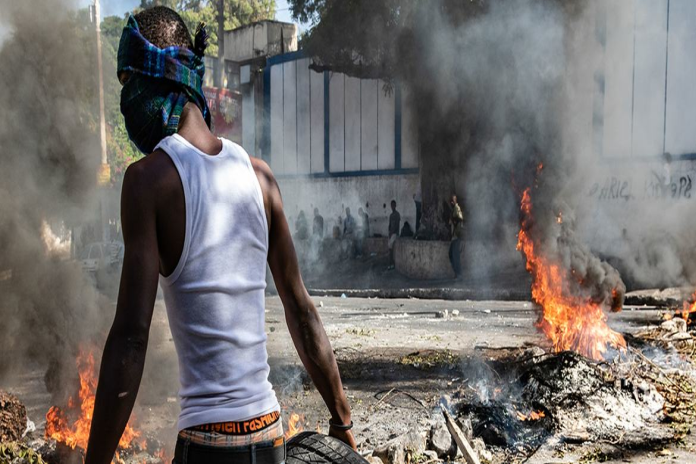PORT –AU– PRINCE, Haiti – The establishment of a multinational security support mission for Haiti is moving closer as the Caribbean nation continues to face a crisis of violence and insecurity caused by entrenched criminal gang activity.
Media reports suggest that infrastructure for the mission is being put in place as supplies arrive by air into the capital, Port-au-Prince.
Here’s what you need to know about what happens next:
Why is an international security mission necessary?
Haiti is wracked by violence that has escalated to unprecedented levels. In an address to the UN Security Council on 22 April, the Special Representative of the Secretary-General for Haiti, Maria Isabel Salvador said “it is impossible to overstate the increase in gang activity across Port-au-Prince and beyond, the deterioration of the human rights situation and the deepening of the humanitarian crisis,” adding that she had “consistently called attention to the inexorable requirement to restore security conditions.”
In March 2024, gangs mounted coordinated attacks targeting key state infrastructure, including multiple police stations and two of the main prisons in Port-au-Prince as well as educational and health facilities and religious sites.
“These attacks,” said Ms. Salvador, “have further weakened state institutions and deepened the already critical challenges to the re-establishment of rule of law.”
In the first three months of the year, the UN said 2,500 people, including at least 82 children, were killed or injured as a result of gang violence.
Almost half of the victims were hit by bullets during violent attacks against their neighbourhoods or clashes between gangs and the police.
At least 438 persons were kidnapped for ransom during the same period.
The UN said that some 362,000 people – half of them children – have been forced to flee their homes because it’s just too dangerous to remain.
Sexual violence and abuse against women and girls are on the rise, and tens of thousands of children are unable to attend school due to insecurity.
Who is supporting the security assistance?
The Haitian National Police (HNP) is unable to fully contain the outbreak of violence, and Haiti’s military is small and only modestly equipped.
Just about everyone agrees that assistance from the international community is needed to support the HNP in its efforts to stabilise the situation and make it possible for Haitians to go about their daily lives without the fear of falling victim to gang violence.
As far back as October 2022, UN Secretary-General António Guterres responded to a request from the former Haitian Prime Minister Ariel Henry, urging nations to step forward.
The Bahamas, Bangladesh, Barbados, Belize, Benin, Chad, Jamaica and Kenya have officially notified the Secretary-General of their intent to contribute personnel to the support mission.
The UN Spokesperson confirmed that other countries had expressed interest in supporting the mission, but that the UN had not yet received official notifications to that effect.

Why has it taken so long to establish the mission?
A major sticking point initially was which country would step forward to lead what could be a very complicated and risky mission.
Media reports suggest that gangs exert some control over around 80 per cent of the capital. A recent reported agreement between gangs to form a united front against the mission has further complicated the picture.
Kenya will lead the mission. Kenyan officials visited Haiti to hold talks with Haitian and regional leaders, among others, regarding its mandate and scope.
The Kenyan president, William Ruto, told the UN General Assembly in September 2023 that Haitians were “suffering immensely from the bitter legacy of slavery, colonialism, sabotage and neglect”, adding that dealing with the situation there was the “ultimate test of international solidarity and collective action”.
What type of operation will it be?
It’s important to note that the security mission will not be a UN operation.
However, the Security Council authorised the mission and asked the secretary-general to establish a trust fund to channel voluntary contributions to the operation.
At the end of April, the UN Spokesperson confirmed that $18 million had been deposited in the fund by Canada, France and the United States.
What happens next and what is the UN’s involvement?
In endorsing the mission, the Security Council acted under Chapter VII of the UN Charter, which, among other things, authorises the use of force after all other measures to maintain international peace and security are exhausted.
Meanwhile, the UN continues to support Haiti on multiple fronts. A political mission, known by its French acronym, BINUH, and which is led by Salvador, continues to support government efforts to strengthen political stability and good governance, including the rule of law.
UN agencies are providing humanitarian aid to Haitians affected by violence and insecurity, but also by natural disasters such as the August 2021 earthquake. The UN Humanitarian Air Service (UNHAS) is currently transporting aid workers, critical equipment and lifesaving aid into and across Haiti. At the same time, the UN also continues to support authorities in strengthening socio-economic development.





